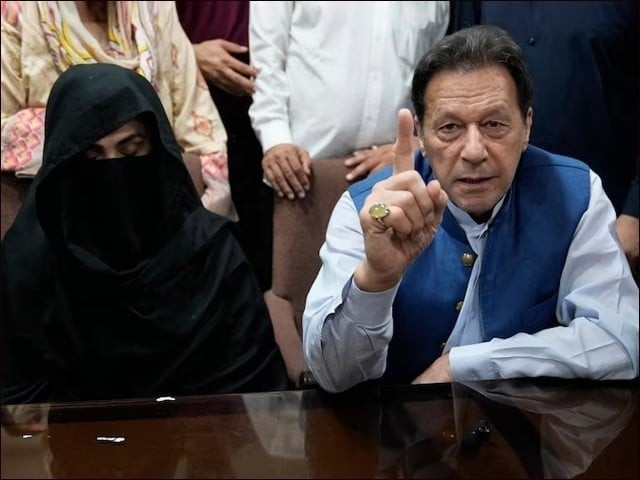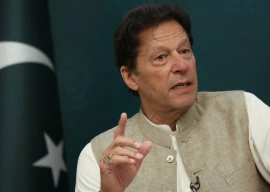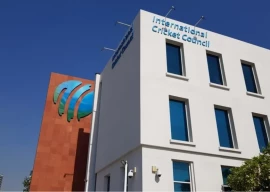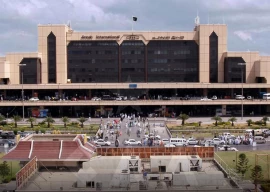
The Islamabad High Court (IHC) has directed the trial court to halt the final verdict in the £190 million case involving Pakistan Tehreek-e-Insaf (PTI) founder Imran Khan and his wife, Bushra Bibi, following a request for acquittal. The court issued the order as part of ongoing proceedings in which the PTI leader seeks to have the charges dismissed.
The case was heard on Wednesday by a two-member bench, comprising Chief Justice Aamer Farooq and Justice Mian Gul Hassan Aurangzeb.
The court also addressed objections raised by the Registrar’s Office. Both parties requested that the trial court suspend its decision-making process until the appeals in the IHC are resolved.
The petitioners argued that the trial court should not proceed with the case while it is under review by the High Court. After hearing the arguments, the IHC barred the trial court from issuing a final ruling on the matter, granting the petitioners temporary relief.
The £190 million case has drawn considerable attention due to its high-profile nature. Imran Khan and his wife are seeking acquittal. The court’s decision ensures the trial will remain in limbo until the High Court concludes its hearings on the matter.
Previously, Imran Khan and his wife, Bushra Bibi, filed an appeal in the Islamabad High Court, challenging an accountability court's decision to reject their acquittal plea in the £190 million corruption case.
The appeal, filed by their legal team led by Barrister Salman Safdar and Khalid Yousaf Chaudhry, contested the court's 9th September ruling.
In their petition, the couple argues that their acquittal was justified based on merit, claiming there is insufficient evidence to warrant a conviction.
The appeal calls for the accountability court's decision to be overturned, with Khan and Bushra Bibi seeking to be absolved of all charges.
A separate application for a stay order has also been submitted, urging the court to pause proceedings until the appeal is addressed.
The £190 million case has been a point of contention, with the couple claiming their innocence throughout.
The case centres around allegations of misuse of authority and personal gain through government decisions and donations.
The case is based on a meeting of the federal cabinet chaired by Khan in December 2019, during which a confidential deed was approved.
The NAB prosecution argues that Imran Khan did not fully disclose the facts to the cabinet members and pressured them into approving the confidential agreement without proper scrutiny.
According to the prosecution, Khan and his wife received illegal benefits from the deal, including 458 kanals of land in Jhelum, Rs285 million in cash, and other advantages under the pretext of donations to the Al-Qadir University Project Trust.
The couple is also accused of receiving 240 kanals of land through an associate, Farhat Shehzadi, furthering their personal gain.
Khan's defence, however, argues that the case falls outside the jurisdiction of the National Accountability Ordinance (NAO) and that the cabinet's decision is protected under the amended law.
The former prime minister contends that the NAB has exceeded its authority by filing what he calls a "false and frivolous" reference against him, alleging misuse of his office.
Earlier this month, the accountability court dismissed the acquittal petitions filed by Imran Khan and Bushra Bibi, rejecting their argument that the case lacked merit.
The court's decision, presided over by Judge Nasir Javed Rana, was a significant blow to Khan, who is already facing legal battles on multiple fronts. His legal team, led by Barrister Salman Safdar, has now appealed the verdict in the Islamabad High Court.


1732003896-0/Zendaya-(1)1732003896-0-165x106.webp)
1731914690-0/trump-(26)1731914690-0-165x106.webp)
1732003946-0/BeFunky-collage-(70)1732003946-0-165x106.webp)
1732000275-0/Untitled-design-(9)1732000275-0-270x192.webp)


1732002687-0/Untitled-design-(11)1732002687-0-270x192.webp)

1732000005-0/Express-Tribune-(2)1732000005-0-270x192.webp)








1731749026-0/Copy-of-Untitled-(3)1731749026-0-270x192.webp)






COMMENTS
Comments are moderated and generally will be posted if they are on-topic and not abusive.
For more information, please see our Comments FAQ